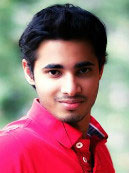 By Abhinav Ajaykumar, PhD Candidate in Côté Lab, CBR
By Abhinav Ajaykumar, PhD Candidate in Côté Lab, CBR
As part of the mentorship program, Sunny and Tea spent a month in the Côté lab assisting me on a project that investigated the effects of maternal HIV antiretroviral drug burden during pregnancy on infant mitochondrial DNA. While working in the lab, Sunny and Tea were able to gain technical knowledge on how to extract DNA from blood, as well as hands-on science experience quantifying DNA via PCR and separating DNA fragments via gel electrophoresis. At the same time, they were able to broaden their theoretical knowledge on topics, such as the epidemiology of HIV infection, the HIV life cycle and how different antiretroviral drugs inhibit viral replication to curtail its spread.

High-school students, Sunny Park and Tea Yates, doing research in a the CBR laboratory.
From handling a pipette for the very first time to setting up PCR plates on their own, the confidence they showed in mastering complex molecular biology techniques was a reward in itself. Being involved with the Centre for Blood Research community for the past three years, I have been fortunate to witness the emphasis that this organization lays on knowledge translation. In its pursuit of promoting research excellence, the CBR has been a front-runner in providing unsurpassed training experiences for its many scientists and student trainees. Our success is not measured in the number of scientific publications, but in the wealth of knowledge shared among the community. In keeping with this, the CBR has recently diversified its quest for knowledge dissemination among people of all ages, by providing hands-on research experience to some of our city’s young, bright minds through the high school student mentorship program. I was fortunate to aid in the endeavors of the CBR community by serving as a mentor to Sunny Park and Tea Yates, two Grade 10 students from the Prince of Wales Mini School, Vancouver.
Any mentoring relationship can be beneficial to both the mentor and the mentee, personally and professionally. What set this particular experience apart from any of my previous mentorship activities was how working with someone substantially less experienced than myself encouraged me to step outside the regularities of scientific reasoning and look at things with a new perspective.
It was refreshing to move away from the world of “p-values” and “statistical significance” and spend multiple afternoons with Sunny and Tea engaging in educational discussion regarding the goals of our project and the questions we hoped to answer. In the process, I learned to tell a story, rather than just burying them with interconnected scientific facts. Moreover, by challenging them to think on their own and come up with their interpretation of our experimental results, I was able to understand their take on our story’s ending. Within a short time, I saw myself grow from a good instructor to a good teacher.
“Before I started the mentorship program, I was only 80% sure about going into the sciences. Now that I have had hands-on experience in the program, I am certain that I will pursue a career in the sciences” says Sunny.
Such is the dilemma faced by most high school students whereby they are stuck at this “80% sure” state and unable to zero down on a career path.
“This mentorship opportunity not only taught me about HIV and antiretroviral drugs, or how to perform a bunch of cool assays, but more importantly showed me what being a scientist is all about and whether I could see myself as one down the line” says Tea.
By providing students an all-inclusive first-hand experience into the day-to-day life of a modern scientist, therein lies the most invaluable contribution that such “learn-by-doing” science mentorship programs have to offer. This may help paint a clearer picture of what a career in science entails and in turn may be the deciding factor that tips the “surety scale” from 80% to 100%.
By taking this opportunity to share my experiences and impart knowledge to my mentees, it was personally satisfying to know that I may have instilled a genuine passion for research among them and contributed in one way or another to their growth and development. Along with being a highly educational experience for all three of us, to quote Sunny and Tea – “it was definitely worth it!”


